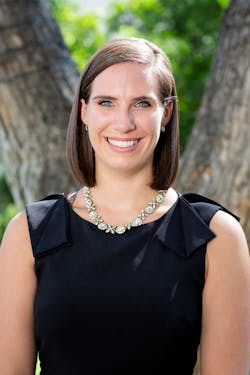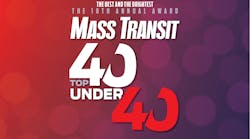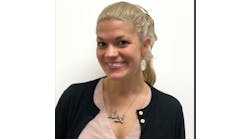- One word to describe yourself: Tenacious
- Alma mater: University of Illinois Urbana-Champaign (B.A. and M.A.)
- Favorite book: "Cat’s Cradle" by Kurt Vonnegut
- Favorite hobby: Exploring the great outdoors
- Favorite route you have ever ridden or frequent (and why): Washington Metropolitan Area Transit Authority Metrobus X2,Benning Road - H Street in Washington, D.C. "For anyone who has ever ridden this route on a daily basis, they will understand."
Dropping out of planning school was ironically the catalyst of Marla Westervelt’s career in public transportation. While pursuing a joint master’s degree in political science and urban planning, she had completed the requirements for the political science portion of her master’s when she headed to Washington, D.C., for a summer fellowship at the Eno Center for Transportation. By the end of summer, her boss convinced her to graduate with only the M.A. in political science and to extend her fellowship for another 6 months.
While the riskiest career move she has ever made, it has paid off in dividends. Westervelt currently serves in Metro’s Office of Extraordinary Innovation (OEI) as a principal transportation planner, serving as OEI’s head of research and a new mobility project manager.
As head of research, it’s her responsibility to research transit agencies across the world and explore what they are doing well, where there is room for improvement, and identify best practices and leading-edge technologies to incubate and implement in Los Angeles County. Examples of her research while at Metro include “UpRouted: Exploring Microtransit in the United States,” published by the Eno Center for Transportation, and “Partnerships with Technology Enabled Mobility Companies: Lessons Learned,” published by the Transportation Research Board.
As a new mobility project manager, Westervelt designed and developed a winning Mobility on Demand Sandbox proposal, which is a partnership between regional transit operators in Los Angeles, the Puget Sound, a team of researchers, and Via, to implement a first and last mile(s) transportation network company (TNC) partnership in both the Los Angeles and Puget Sound regions. After implementation, this partnership will be the first of its kind to have effectively created a contractual structure enabling the TNC to provide an affordable, equitable, and accessible service available to all customers through a public-private partnership, effectively sharing risk and reward. Further, through this partnership Westervelt has become a thought leader in defining the role of the public sector in managing new mobility data.
Prior to working at Metro, Westervelt served as a senior policy analyst and assistant editor of Eno Transportation Weekly at the Eno Center for Transportation, the leading inside the beltway, national-level transportation policy think-tank. At Eno, she played a critical role on the research teams that published works, including “Getting to the Route of It: The Role of Governance in Regional Transit” and “The Life and Death of the Highway Trust Fund: How we Pay for Transportation.
Westervelt also led Eno’s NextGen Working Group, which brought together a research-based coalition around air traffic control (ATC) governance restructuring, leading to an effort in the House of Representatives to fundamentally reform the Federal Aviation Administration’s role in ATC. In addition, she developed and led Eno’s Digital Cities Advisory Board, which is positioned to lead the way in defining effective relationships between the public and private sectors in the new mobility revolution.
Westervelt has served on the board of Young Professionals in Transportation, the Women’s Transportation Seminar, and the Transportation Research Forum. She regularly participates in speaking engagements at many conferences and has interviewed with national news outlets, including CNBC and C-SPAN.
“Surprisingly enough, dropping out of planning school led me to where I am today. I was in the midst of pursuing a joint master’s in political science and urban planning. I had completed all of the requirements for the P.S. portion of my master’s and defended my thesis before I headed out to D.C. for a summer fellowship at the Eno Center for Transportation. By the end of the summer, my boss had convinced me to drop out of school, graduate with only a M.A. in P.S., and extend my fellowship for another 6 months. To date, it was the most risky career move that I have made, but certainly has paid off in dividends.”
“I love that I actively feel like I’m making the world a better place, improving communities and lives, and pushing the envelope for what constituents can expect from their governments.”
“The most challenging part of my job is being a young woman in a field that is predominantly male and relatively seasoned. It’s definitely challenging to be able to get a seat at the table and to be able to get my voice heard. But that also provides me an opportunity to continually seek to change the conversation on these demographic divides and always provide fellow women a hand-up whenever possible. “
“I am extremely proud of the role that the Office of Extraordinary Innovation has played in being a thought leader in the mobility space, from raising the bar on New Mobility projects, to getting a transformational strategic plan approved by our board, to working toward creating the largest P3 program in North America. The team that my boss Joshua has pulled together to lead these challenging projects and initiatives is nothing less than remarkable and I am so grateful I get the opportunity to work with them side-by-side."





